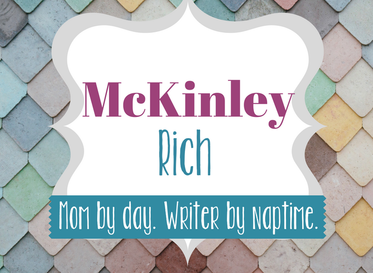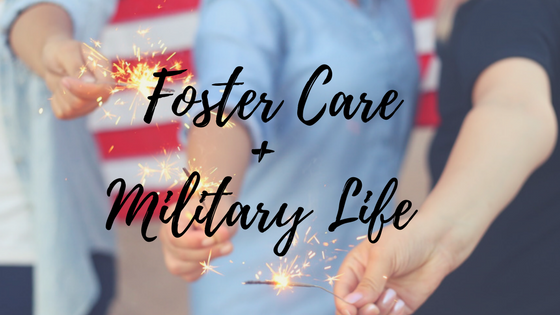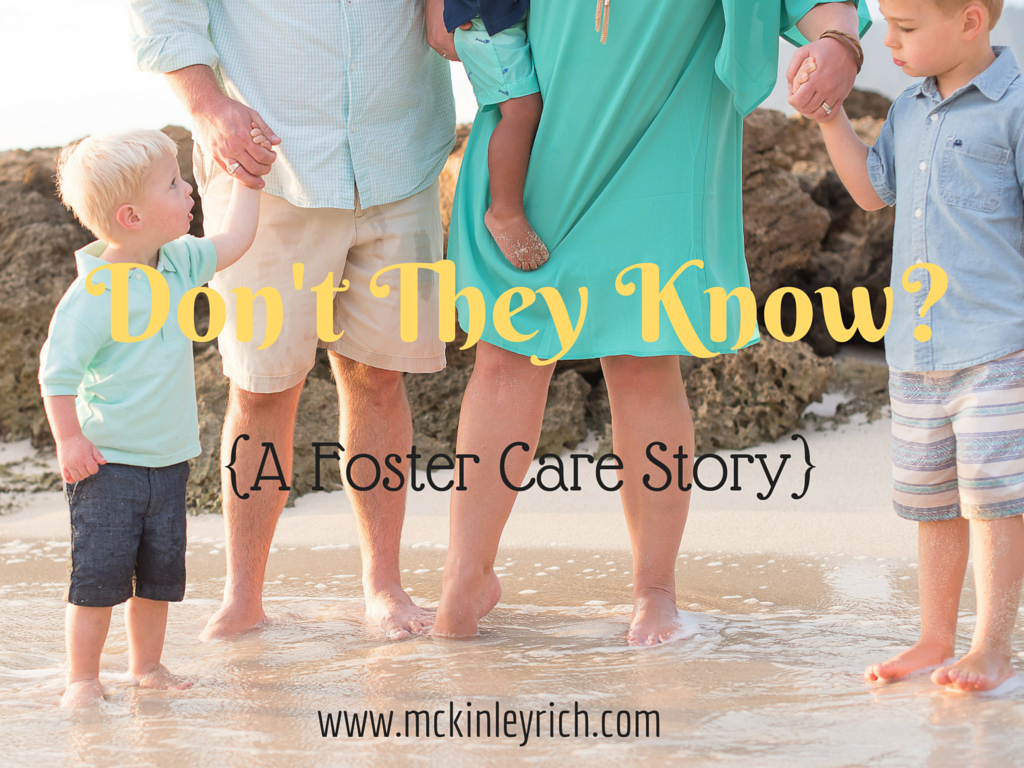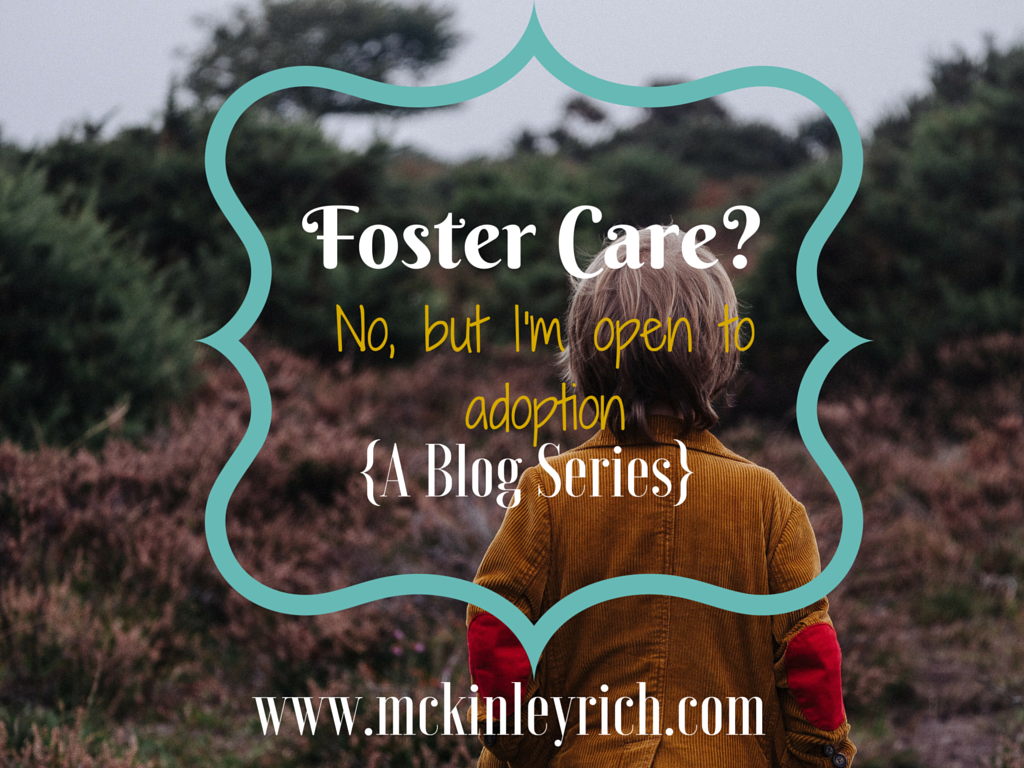|
Hey there, friends. I know this space has been eerily quiet recently and I'm sorry. It turns out when you are launching a book, it feels like you're yelling in a lot of different directions, and some (aka MANY) parts of your life get pushed aside. It seems weird to have pushed away a writing space when you're saying "Hey! Look what I have written!" but I don't think I had any words left after launching my first book, so it's probably for your benefit. If you've been here a while, you may be wondering, what's happening with McKinley? Or if you're new here, you are like "What am I even doing here, I don't know who this person is?!" Either way, I need to let you in on a little secret that is about to infiltrate our entire little world with a whole lot of love - we are getting another foster babe! I have approximately one million things I want to tell you about this little fella, but I'm going to save that for a post next week. For now, I want to share an article I wrote for our local Foster Care Newsletter that answers one of the most common questions I get, "How difficult is it to serve as a Foster Family when you're in the military?" I answer that question a lot, and wanted to offer up a little insight into why I believe that Military Families are incredibly well-suited to be amazing foster parents. So without further ado, here is the article I wrote... It was a crisp, autumn afternoon in Virginia and my phone began to ring. I slid my finger across the screen and put the phone to my ear, “Are you sitting down?” my husband asked.
My heart dropped. What could it be? He had just gotten back from a six-month deployment two weeks earlier. Please tell me he isn’t going again. Has someone died? The questions kept brewing in my brain before I had the strength to find a chair. “Yes, I’m sitting. Is everything ok?” “You’re never going to believe this,” he said, “but I just got orders and we are moving to Hawai’i!” “Are you serious? That’s amazing!” I retorted, “But please, don’t ever scare me like that again.” For the next several months, I dreamt about palm trees, beautiful beaches, learning the Hawaiian culture, and obtaining the golden tan I always longed for as a child. Little did I know that there was so much more for us to discover during our tour in Hawai’i. Any military family knows that the moving process is all consuming. It took us at least a month before we began to surface above the boxes and packing paper and logistics that come with moving an entire household across an ocean. But, once the dust had settled, we were excited to face our Hawaiian adventure head-on. That’s when we met Mary and Troy. They lived just a few doors down from us on base, with children the same ages as our own. But, in addition to their biological children, Mary and Troy were also serving as resource caregivers. I had never met a military resource family before, and was intrigued by the idea of it. I began bombarding them with questions about the licensing process and how foster care intersects with military life. I mean foster care is so unpredictable, so uncertain, so emotionally draining, right? Could my little military family handle it? And then, as if the answer fell from the sky, I realized that these struggles weren’t so foreign to me after all. Aren’t we, as military families, experts at handling unpredictable situations— like when orders come through at the last minute? Are we not adept at wading through uncertain waters of pending deployments and imminent Temporary Duty Assignments? Don’t we guide our families through all of the emotions that are associated with moves and deployments, however draining it may be? In many ways, the struggles of resource families are the same ones military families face. Maybe we could handle it, I thought, but is two to three years enough time to make a difference? It was about this time in our foster care exploration that I read this quote by Mother Teresa, “We know only too well that what we are doing is nothing more than a drop in the ocean. But if the drop were not there, the ocean would be missing something.” The words hit me like a ton of bricks. Serving doesn’t have to look like a twenty-year investment. It doesn’t take decades to love your neighbors well. Mother Teresa’s words pierced my heart and reassured me that while our transient lifestyle doesn’t allow us to invest long-term in communities, we must not forego the opportunities afforded to us in the short-term. As much as the frequent moves seem to disrupt our lives as military families, I choose to see them as opportunities for new beginnings. Here in Hawai’i we have chosen to serve as resource caregivers, but when we move away from the island, our service to our new community might look different. The choice to foster while on military orders is a temporary commitment, which allows each family to fully invest in the system for a finite time period. For us, foster care looked like the right short-term opportunity. In December of 2015 we received our first foster placement. During his time in our care, we dealt with bumps along the way and faced any uncertainty head-on while wondering how long he would remain in our home. But most importantly, through this experience, we have been able to not only enjoy the opportunities Hawaii has to offer, but also invest in its communities—giving back just a portion of the gifts Hawai’i has given us. In May 2016, we said “good-bye” to our first foster child, as he went to live with family. I wondered how my boys, ages four and two, would respond. He was very much a part of our family, but I was surprised his departure didn’t rock the family boat more. My boys still ask about him, but they aren’t distraught. They still include him in family drawings, but aren’t grieving. I, on the other hand, have been a bit of a mess at times. Why are they so resilient? Sure, part of it comes from the innocence of youth, but I realized soon after our foster child’s departure, that the boys talk about him much like they talk about their friends from Virginia. Their experience as military kiddos has prepared them well for this transition. Their ability to love deeply while in the presence of friends, but also transition into a new normal without their friends is simply a byproduct of being a military brat. I clearly have a lot to learn from my boys. While I never imagined that the military life would lead us to foster care, the connection isn’t too far off base. After all, in order to serve our nation well, we have to adequately care for our local community. And so, we are incredibly grateful for the opportunity to serve as resource caregivers and invest in the people of Hawai’i for as long as Uncle Sam allows. ***This article was original published in Hui Ho'omalu's Building Connections Newsletter
0 Comments
He’s leaving us tomorrow. I mean…they are taking him away. Or should I say they found him another home? I’m not sure which way to say it because all the words sting. Don’t they know I listened to him speak his first words? Or that he called me “mommy” long before the age that either of my boys gave me that title? Don’t they know I spent weeks desperately trying to get him on a schedule – rocking his little body, rubbing his back, crying out in exhaustion wondering how on Earth I would care for this child? Don’t they know my boys call him “brother”? What will they think when their “brother” no longer lives with us? Will they wonder if their time in this home is conditional, too – if it’s temporary? Don’t they know that I can’t cook dinner without wearing him on my back? Or that the minute I put him down, he cries “Hold me, mommy” until I reach out again to scoop him up? I mean, seriously, DON’T THEY KNOW? It’s been four weeks since we found out our little BF** was leaving us. We sat face-to-face with the social worker as she broke the news slowly. I could tell she was surprised – surprised that the state had found family who were not only interested in caring for him, but also suitable caretakers. My mouth became dry, the tears began to well up under the surface. A knot filled my throat and I was unable to speak. My brain was going through the facts, “Come on, McKinley. You knew this was a possibility. It is Foster Care, after all.” But my heart was cracking because deep down I pictured him in our family forever. And, to be honest, I had to. I couldn’t be anything less than all in. All in to caring for him. All in to including him. All in to loving him unconditionally. All in to nurturing him and teaching him and shepherding him as if he was my own. But the risk of being all in is that you have it all to lose. “So now what?” I wondered. Are they going to just show up one day and take him away? Is he going to cry uncontrollably as they pry him away from my body? Will I be able to let him go? Are we going to stare at each other with tears in our eyes as the state car drives away, taking him to his fourth home in seven months? Are we going to see him again or will we forever wonder what his little life holds? The questions kept filling my brain as I stared at the social worker and did my best to stay calm and nonchalant. “Oh, yes, I’m ok”, I muttered. “I always knew this was a possibility. I’m so thankful he gets to live with some family members.” The right words were flowing from my mouth, but my heart was wrenching inside my chest. There is a selfish part of me that wanted the dramatic ending. An ending where somehow I felt validated in the work I had done – a sort of pat on the back. A part of me that wanted to see the new caretakers face the same struggles that I had. A part that wanted someone to look at my family and say, “I’m sorry, we know you are the best option for baby, but we have to follow the state’s rules and place him with family.” As I type those words, I am slapped in the face with the realities of our human condition. I am completely selfish and terribly broken. What would make me wish struggles on his new caretakers? Why would I want a dramatic (and traumatic) ending? It’s incredible how our defense mechanisms start building formidable walls around our hearts when we face loss and grief. It’s been a prayerful and daily decision to break those walls down and hope for the best possible transition for BF, because, after all, HE (and other children like him) are the reason we dove into this journey in the first place. For the past three weeks we have been in the transition process. BF had previously only met his new caretakers one time in his life, so it was important that he built a relationship with them before the final transition occurred. The visits started gradually and increased in frequency and duration. My heart felt like it was playing a game of tug-of-war. The family members were pulling him in with great enthusiasm, while I was struggling to hold on. Then, when BF would return to our home, my heart briefly felt that I was gaining ground in the game, but my head knew that wasn’t the case. I began to wonder, does it have to feel this way? Do I have to be hurting when they are joyful? Or can I adjust my thinking to gain new perspective? After the first two weeks of tugging on my heart strings, I began to see the transition differently. I understood that if I’d give up my selfish desires, it could look less like tug-of-war and more like “Parachute Day” in an Elementary P.E. class. The parachute only works when we have multiple people holding a different edge of the chute all waving our hands up and down in unison to make it float or flap or bounce a ball. With more people around the edge of the parachute, we are now able to lift the parachute up really high and sneak underneath to sit on the edge – creating a peaceful protective haven around our little fella’. No one wins in a tug-of-war game. Sure, you might have pulled the other team across the centerline, but you are undoubtedly sore, exhausted and perhaps squarely on your bottom. But around the parachute, we are energized, encouraged, bound to one another with the same goal. By giving BF these new caretakers, we’ve simply added two more people around the parachute who are ready to lavishly love him. So what about our job? What was the point? There is a clothing company in Hawaii whose logo looks like this: You see it everywhere – on car decals, on shirts, on shoes, on surfboards. When friends come to visit, they often ask “What is that ‘Heki’ brand that I see all over the place?” “It doesn’t actually say ‘Heki’,” I reply. “If you look closely it just says HE>i ‘He is Greater than I’”. The logo was inspired by John 3:30 that says, “He (Jesus) must become greater and I must become less.” John the Baptist spoke these words as a way to point people to Jesus. God sent John as a prophet just before Jesus began his ministry and John never forgot that his main role was to announce the coming of our Redeemer. The words in John 3:30 are words of selfless adoration for the One true Savior. We haven’t been called to be BF’s permanent saviors – his new caretakers have. And while we have done our best to point BF to the Almighty Savior during his time in our home, we must also point him to his new earthly saviors. They must become greater in BF’s eyes and we must become less. As I was reading more about John the Baptist, I was reminded again that he himself was a miracle baby. Do you know who his parents were? Yea, I couldn’t remember either – Bible memorization has never been my gift, so help me, Jesus. In Luke 1:5-23 we find the story of Elizabeth and Zechariah the priest. “Both of them were upright in the sight of God,” we are told in scripture, but they had no children. Elizabeth was barren and they were both well beyond childbearing age. But alas, God had greater plans for these servants and sent his angel, Gabriel, to tell them they would finally bear a son. Much like we waited to welcome BF into our home, so too did Zechariah and Elizabeth wait to have a child. Gabriel told Zechariah in verses 16-17 that his son “would bring the people back to the Lord Their God and would go before the Lord, in the spirit and power of Elijah, to turn the hearts of the fathers to their children and the disobedient to the wisdom of the righteous – to make ready a people prepared for the Lord.” That is a SERIOUS promise for a son. Can you imagine what it would be like to have such a clear and distinct calling on your child’s life? Can you imagine how much John must have learned from his father Zechariah? I’m sure he was reminded daily about the promise God made with him. I bet Zechariah constantly told John how he was called by God to fulfill a great mission on this Earth. Whenever John would doubt his abilities, I’m sure Zechariah’s love and encouragement kept John motivated to move forward in advancing the Kingdom of God. John the Baptist didn’t just come out of nowhere to prepare the way for Jesus. God had a plan for him that is recorded in scripture, and John stays true to plan throughout the Bible. Just like John, God placed a specific calling on our lives – care for orphans. Sometimes we doubted if that’s really what God wanted us to do, but then He sent us BF, our own little Zechariah, to remind us of the promise he made to us last summer. Everything about BF was a reminder of God’s promise to us. The way he smiled at us. The way he demanded our attention and clung to us. The way he melted in our arms. All of these were reminders that he desperately needed a home and God had sent him to us for that exact reason. God’s promise was clear to us last summer, but when we were in the middle of the storm, sometimes we needed our own Zechariah to remind us of it. Tomorrow is coming, and he is leaving. Daniel, the boys and I have done what we believe God called us to do. To be clear, we did not do it perfectly by any stretch of the imagination, but through it all, we strove to be obedient. We have served BF when he needed it the most and our job now is to point him in the direction of the new caretakers. And for those of you who might be interested, they are lovely people who are beyond excited to parent him in the event his parents aren’t able to. While heart-wrenching at times, the transition has gone as smoothly as possible, and all reports from the family say that he is adjusting well and is happy throughout the day when he is with them. There will be no drama and most importantly no trauma for BF. The new caretakers have been incredibly gracious towards us and want us to continue to be a part of BF’s life. When it comes to Foster Care stories, our story is a highlight – a beautiful textbook example of what can happen when people put the child’s needs first. I guess maybe THEY DO KNOW. They know that he will be loved unconditionally by his new caretakers. They know that he will grow up knowing his Hawaiian culture and speaking his native language. They know that I was his Mommy when he needed one the most, but that he will also readjust beautifully to his new home. They know that BF will grow up to know his family members in a safe and healthy way. They know that we love him, but they know that he will be just as loved in his new home. I guess they knew it all along, but now, I know it too. **BF is the term I use when referring to our foster child. It stands for "Baby Friend" since that is what my sons referred to him as long before he entered our house.
This is the 4th post in a series, "Foster Care? I could never do that". Click here for the previous post. Since we started dating, Daniel and I have discussed the possibility of adopting a child. My adoption heart has been drawn to Ethiopia, then to Haiti, and then came full circle back home to the United States. But despite our desire to adopt a baby, we shied away from foster care because of the other reasons I talked about here, here and here. And even though we had discussed the idea of adoption, it was often an after thought – we will adopt AFTER we have our bio kids, or we will adopt AFTER we have the finances in place or we will adopt AFTER our other kids are grown. I liked the idea of adoption, but it came with many conditions – conditions that I could control and quantify. Growing up I pictured my family with four children – three biological little blondies and a wild card spot that could be filled by either an adopted child or another biological one. From the minute my second son arrived, I have referred to him as my middle child, not my youngest—he was just another stepping stone to building our family. If I talked to you last May, I would have told you we would start trying to get pregnant in August of 2015, because that was what MY life plan looked like. I guess God had a different idea. There is no doubt in my mind that I want more children permanently in my home – so why then, would we consider foster care if we must risk giving a child back? That’s a great question—one that I asked myself (and God) approximately one bazillion times. (I would have made a great Pharisee, always asking questions trying to stump Jesus.) Unfortunately for me, He keeps providing answers to every single one of my questions. It’s starting to get annoying. Disclaimer: I am not a foster care expert and the processes are different in every state – I simply know the process in the one state I’ve fostered in, Hawaii – so don’t assume all the logistics are the same everywhere. In Hawaii, there is no option to “foster to adopt”. Due to the “Ohana” (family) culture that exists here, the state has a strong desire to reunite children with their birth family. In fact, 75% of children in Hawaii’s foster care system are reunited with some kind of family. Knowing this, we understand that our chances of adopting through foster care in Hawaii are not statistically in our favor. Even so, we have committed to serve children in foster care during our time in Hawaii, whether or not it leads to adoption. I now know that God is in control of our family, and He will build it however He sees fit. So if after our time here we have been able to adopt through foster care, then great! But, if not? We will trust in God’s plan for our family and be grateful for the children we were able to serve. Can I tell you how much this uncertainty scares me? A whole freakin’ lot. But I know this – I am more scared to turn away from the foster children we can serve here than I am to figure out how we can build our family. What I love about the way God works, is that He often answers prayers bigger and better than I even imagined. It had become very clear to us that we needed to foster, but I didn’t realize how fostering is arguably the most appealing and logical way to go about adopting a child. Like I said, we are unsure if we will be able to adopt, but if we are, there are a lot of perks from fostering first. A friend once told me that the beautiful part of fostering is that, unlike a private adoption, you are able to have a “test run”. By welcoming a child into your home through foster care, you can begin to understand if this kid is really a good fit for your family. You will often gain in depth knowledge about this child’s family history and experience their strengths and shortcomings first hand. By no means are you required to to adopt a child you’ve served in foster care, but at least you are able to make a fully informed decision – assessing how the child fits into your family’s dynamics. Secondly, unlike private adoption, there is little to no financial burden. During a child’s time in foster care, the foster parents are paid a monthly stipend. The state (at least in Hawaii) usually covers the cost of the home study as well as any legal fees associated with a foster child's adoption. And while the prospect of income is no reason to foster, it does make adoption incredibly more affordable for families who aren’t able to raise the $30,000-$40,000 for a private adoption. Lastly, we feel that we can serve the greatest need by looking to adopt a child in the foster care system. And while these kiddos potentially have more trauma in their lives than the newborns adopted through private agencies, they are still deserving of a loving home. Our hearts were almost healed and I knew we were called to foster, but one detail was still perplexing. In my limited experience with the system, I only heard of two types of families who foster – poor families who needed the money or precious, saintly, ultra-conservative families. We didn’t fit either bill, so I began to wonder, “Why don’t more middle-of-the-road families do it?” This is the fourth post in a series, "Foster Care? I could never do that". Click here for the previous post.
Next Post: Foster Care? I thought only "_________" families did that. |
McKinleyI am a lover of people, a child of God, and a laugher at jokes. I write words, cry tears and smile at strangers.
Archives
March 2017
Categories
All
|






 RSS Feed
RSS Feed